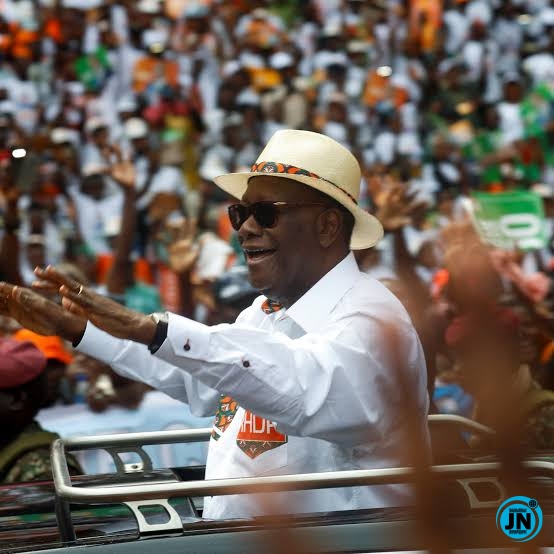Ivory Coast’s long-serving President, Alassane Ouattara, has been declared the winner of the country’s 2025 presidential election, extending his rule and securing a historic fourth term in office. The announcement, made by the Independent Electoral Commission (CIE) on Monday evening, has once again placed the 83-year-old leader at the center of political discussions both at home and abroad.
According to provisional results released by the CIE, President Ouattara won the election by a landslide, garnering 89.77% of the total votes cast. The victory further cements his dominance in Ivorian politics, solidifying his status as one of Africa’s longest-serving leaders. His closest rival, prominent businessman Jean-Louis Billon, managed to secure only 3.09% of the votes, while the remaining candidates shared the rest of the ballots.
Official figures revealed that Ouattara received approximately 3.75 million votes, demonstrating his continued influence and the strong backing of his supporters across the country. The announcement was met with celebration in parts of Abidjan, where jubilant crowds took to the streets waving flags and chanting slogans in support of the veteran leader.

Despite the celebrations, the outcome has also sparked controversy and revived long-standing debates about leadership succession, democracy, and constitutional limits in the West African nation. Critics argue that Ouattara’s prolonged stay in power undermines democratic principles and risks fueling political unrest.
Voter Turnout Statistics
The CIE announced that voter turnout stood at 50.1%, reflecting moderate participation across Ivory Coast’s 31 regions. While turnout was relatively strong in urban centers such as Abidjan and Bouaké, participation in some rural areas was notably lower, reportedly due to logistical challenges and voter apathy.
The electoral commission emphasized that the results remain provisional pending review by the Constitutional Council, which will verify the figures and address any petitions or complaints filed by opposition parties. The council’s confirmation, expected within days, will determine the official conclusion of the electoral process.
Observers from the African Union and ECOWAS described the voting process as “largely peaceful,” though they acknowledged concerns about restricted access for some international observers and uneven media coverage during the campaign period.
Ouattara, in his post-election remarks, thanked Ivorians for their continued trust and vowed to dedicate his new term to national unity, infrastructure growth, and youth empowerment. “Ivory Coast is on the path to transformation,” he said. “Together, we will continue building a nation of stability, opportunity, and prosperity.”
Opposition Parties Reject Outcome
Meanwhile, major opposition figures have strongly rejected the results, accusing the government and electoral body of manipulating the process. The opposition coalition, led by former President Laurent Gbagbo and veteran politician Tidjane Thiam, issued a joint statement denouncing the election as a “civilian coup d’état.”
They alleged that the vote was marred by irregularities, intimidation, and biased administration by the electoral commission, which they claim acted under pressure from the ruling party. The opposition vowed not to recognize Ouattara’s victory, calling for nationwide demonstrations and urging the international community to intervene.
Tensions have reportedly risen in several parts of the country, with small protests breaking out in Abidjan and other cities. Security forces have been deployed around major government buildings to maintain calm, while authorities have warned against acts of violence or unrest.
Ouattara’s political journey has been marked by both progress and controversy. Since coming to power in 2011 following the ouster of Gbagbo after the disputed 2010 elections, he has overseen rapid economic growth, positioning Ivory Coast as one of West Africa’s fastest-developing economies. However, his tenure has also been criticized for its limited political freedoms and the marginalization of opposition voices.
The president was originally limited to two terms under the country’s constitution. However, a 2016 constitutional amendment effectively reset the term limits, allowing him to contest again in 2020 — an election boycotted by major opposition parties — and now again in 2025. His continued leadership has raised questions about democratic succession and generational change in Ivorian politics.
As the nation awaits the Constitutional Council’s confirmation of the results, analysts say Ivory Coast stands at a crossroads: balancing its economic progress under Ouattara’s government with increasing calls for political renewal and inclusivity.
For now, President Ouattara’s fourth term marks another milestone in his enduring legacy — one defined by both economic reform and enduring political debate.